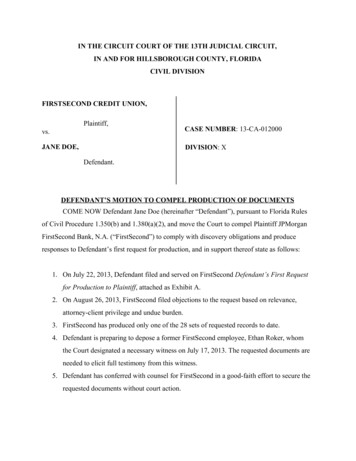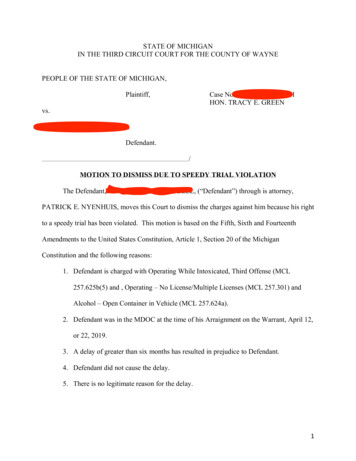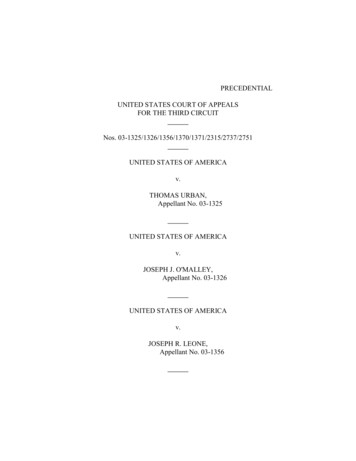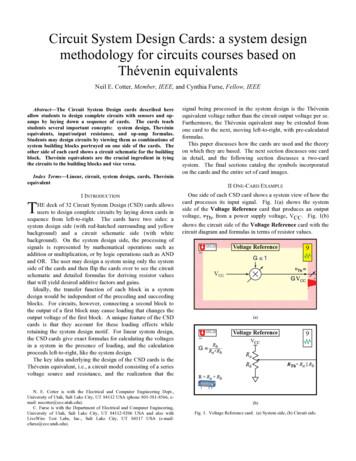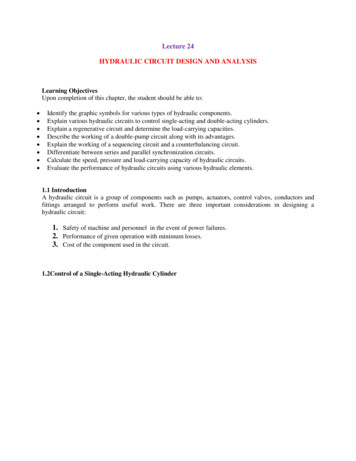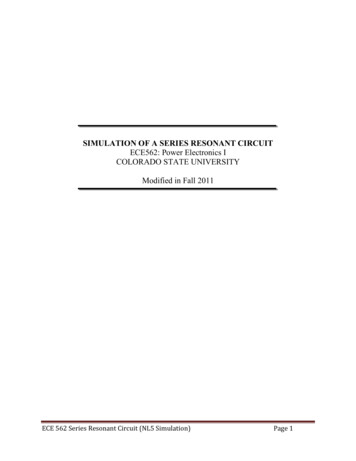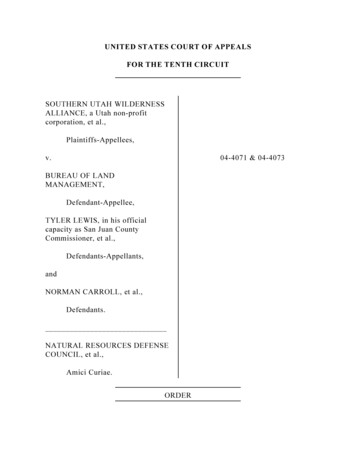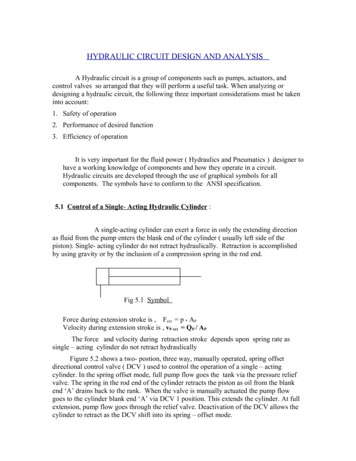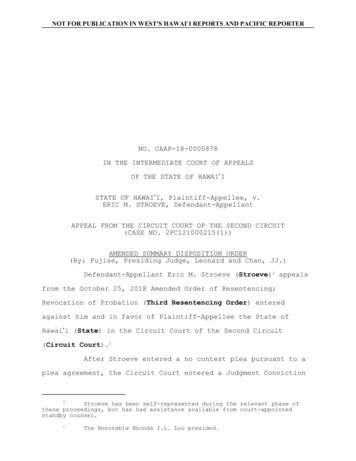
Transcription
NOT FOR PUBLICATION IN WEST'S HAWAI#I REPORTS AND PACIFIC REPORTERNO. CAAP-18-0000878IN THE INTERMEDIATE COURT OF APPEALSOF THE STATE OF HAWAI#ISTATE OF HAWAI#I, Plaintiff-Appellee, v.ERIC M. STROEVE, Defendant-AppellantAPPEAL FROM THE CIRCUIT COURT OF THE SECOND CIRCUIT(CASE NO. 2PC121000215(1))AMENDED SUMMARY DISPOSITION ORDER(By: Fujise, Presiding Judge, Leonard and Chan, JJ.)Defendant-Appellant Eric M. Stroeve (Stroeve)1 appealsfrom the October 25, 2018 Amended Order of Resentencing;Revocation of Probation (Third Resentencing Order) enteredagainst him and in favor of Plaintiff-Appellee the State ofHawai#i (State) in the Circuit Court of the Second Circuit(Circuit Court).2After Stroeve entered a no contest plea pursuant to aplea agreement, the Circuit Court entered a Judgment Conviction1Stroeve has been self-represented during the relevant phase ofthese proceedings, but has had assistance available from court-appointedstandby counsel.2The Honorable Rhonda I.L. Loo presided.
NOT FOR PUBLICATION IN WEST'S HAWAI#I REPORTS AND PACIFIC REPORTERand Probation Sentence dated November 15, 2013, and then anAmended Judgment Conviction and Probation Sentence dated December5, 2013 (Amended Judgment), on one count of TerroristicThreatening in the First Degree in violation of Hawaii RevisedStatutes (HRS) § 707-716(1)(b) (Supp. 2013).3Stroeve wassentenced to a five-year term of probation with various generaland special terms and conditions of probation.Upon the State'smotion, on May 8, 2015, the Circuit Court filed an Order RevokingProbation and Resentencing Defendant (First Resentencing Order)ordering that Stroeve's probation was revoked.Stroeve wasresentenced to another five-year term of probation commencing onOctober 24, 2014, which included, inter alia, all previouslyordered general and special terms and conditions.On March 11, 2016, the State filed a second motionseeking revocation of Stroeve's probation due to allegedviolations of the terms and conditions of probation.Aftervarious hearings, on December 15, 2016, the Circuit Court orallyordered that Stroeve's probation would again be revoked andStroeve would be subject to, inter alia, a new five-year term ofprobation.The new written Order Revoking Probation andResentencing Defendant (Second Resentencing Order) was not3HRS § 707-716 then provided, in relevant parts:§ 707-716 Terroristic threatening in the firstdegree. (1) A person commits the offense of terroristicthreatening in the first degree if the person commitsterroristic threatening:. . . .(b)By threats made in a common scheme againstdifferent persons;. . . .(2) Terroristic threatening in the first degree is aclass C felony.2
NOT FOR PUBLICATION IN WEST'S HAWAI#I REPORTS AND PACIFIC REPORTERentered until June 21, 2017.In the meantime, in a separatecase, Stroeve was charged with multiple offenses, including onecount of Assault Against a Law Enforcement Officer in the FirstDegree in violation of HRS § 707-712.5(1)(a)-(b) (2014),4 arisingfrom acts allegedly committed on June 13, 2017.FollowingStroeve's plea of no contest to one count of Assault Against aLaw Enforcement Officer in the Second Degree in violation of HRS§ 707-712.6 (2014),5 on May 21, 2018, the Circuit Court6 entereda Judgment Conviction and Sentence against Stroeve (OfficerAssault Conviction).Stroeve was sentenced to a one-year term ofimprisonment in that case.In this case, on June 7, 2018, the State filed a thirdmotion seeking revocation of Stroeve's probation based on, inter4The statute provides, in relevant part:§ 707-712.5 Assault against a law enforcement officerin the first degree. (1) A person commits the offense ofassault against a law enforcement officer in the firstdegree if the person:(a)Intentionally or knowingly causes bodily injuryto a law enforcement officer who is engaged inthe performance of duty; or(b)Recklessly or negligently causes, with adangerous instrument, bodily injury to a lawenforcement officer who is engaged in theperformance of duty. . . .5The statute provides:§ 707-712.6 Assault against a law enforcement officerin the second degree. (1) A person commits the offense ofassault against a law enforcement officer in the seconddegree if the person recklessly causes bodily injury to alaw enforcement officer who is engaged in the performance ofduty.(2) Assault of a law enforcement officer in thesecond degree is a misdemeanor. The court shall sentencethe person who has been convicted of this offense to adefinite term of imprisonment, pursuant to section 706-663,of not less than thirty days without possibility ofprobation or suspension of sentence.6The Honorable Richard T. Bissen, Jr., presided.3
NOT FOR PUBLICATION IN WEST'S HAWAI#I REPORTS AND PACIFIC REPORTERalia, the Officer Assault Conviction.At the October 22, 2018hearing on the State's motion, without objection from Stroeve,the Circuit Court took judicial notice of various court records,including the May 21, 2018 Officer Assault Conviction.Followingthe presentation of evidence and arguments, the Circuit Courtfound that Stroeve had inexcusably failed to comply with theterms and conditions of his probation.On October 25, 2018, theCircuit Court entered the Third Resentencing Order, which revokedStroeve's probation and resentenced him to, inter alia, fiveyears incarceration with credit for time served.In his Opening Brief, Stroeve identifies the followingas points of error on appeal:(1) his previous resentencing isan illegal sentence; (2) the Circuit Court abused its discretionin resentencing Stroeve; and (3) the affidavit of Stroeve'sprobation officer, Timothy Stillman (Stillman), which was filedon June 5, 2018, contained false statements concerning Stroeve'salleged violations of the terms and conditions of probation.7Ina subsequently-filed Memorandum in Support of Opening Brief,Stroeve identifies additional points stemming from the originalcriminal proceedings, as well as his previous resentencing.Eachof Stroeve's points contain subpoints.7Stroeve's argument appears to be that Stillman submitted a falsestatement in his affidavit because the terms and conditions of the SecondResentencing Order had not been reviewed with Stroeve because the order hadnot yet been entered at the time that Stillman signed the affidavit. This isa valid point. However, at the October 22, 2018 hearing on the State's thirdmotion for revocation, Stillman clarified under oath that he had not been ableto go over the terms and conditions of the Second Resentencing Order withStroeve because of the delay in the entry of the order and because Stroevestopped reporting to Stillman prior to Stillman's receipt of the order. Asdiscussed infra, however, the Circuit Court's ruling on the third revocationmotion was based on Stroeve's prior receipt and acknowledgment of the AmendedJudgment and the First Resentencing Order, which contained the no-other-crimecondition, and the Officer Assault Conviction.4
NOT FOR PUBLICATION IN WEST'S HAWAI#I REPORTS AND PACIFIC REPORTERHowever, it appears that a number of Stroeve'sassertions and arguments seek to address issues that are notbefore this court on Stroeve's appeal from the Third ResentencingOrder.Stroeve did not appeal from the Amended Judgment, and thetime for doing so has long since passed.Appellate Procedure Rule 4(b)(1).See Hawai#i Rules ofAn order that finally disposesof a post-judgment motion for revocation of probation and resentencing terminates the proceedings on that motion and is thusappealable upon the entry of that order.See State v. Nicol, 140Hawai#i 482, 492, 403 P.3d 259, 269 (2017); State v. Johnson, 96Hawai#i 462, 469, 32 P.3d 106, 113 (App. 2001); State v.Yamamoto, 79 Hawai#i 511, 514, 904 P.2d 525, 528 (1995).Stroevedid not timely appeal from the Amended Judgment, the FirstResentencing Order, or the Second Resentencing Order.Thus, ourreview is limited to the issues and arguments that are relevantto Stroeve's challenge to the Third Resentencing Order.Upon careful review of the record and the briefssubmitted by the parties, and having given due consideration tothe arguments advanced and the issues raised by the parties, weresolve Stroeve's assertions of error as follows:Stroeve first argues that the Second Resentencing Orderconstitutes an illegal sentence because the State added anadditional condition8 to the probation without due process notice8Stroeve consistently refers to "Po#Ailani," which appears to bePo#ailani Inc. treatment center, a facility treating both substance usedisorder and mental illness. See About Us, https://poailani.org/about-us/(last visited January 7, 2020).Stroeve repeatedly argues that the State illegally sought torequire Stroeve attend Po#ailani, but the Second Resentencing Order does notinclude this specific requirement, although it does include that "[Stroeve] is(continued.)5
NOT FOR PUBLICATION IN WEST'S HAWAI#I REPORTS AND PACIFIC REPORTERto Stroeve and contrary to the oral ruling of the Circuit Courtat its December 15, 2016 hearing.Stroeve does not provide atranscript of the December 15, 2016 hearing, and the CircuitCourt's minutes state only that "[the State] informed the courtthat when [Stroeve] completes the program [the State] will thenterminate probation and [the State] also asked for a 90 day timelimit to have [Stroeve] enter into treatment.[The CircuitCourt] revoked and resentenced [Stroeve] to five (5) yearsprobat[ion] and one (1) year jail[.]"Therefore, even if thisissue was reviewable on this appeal from the Third ResentencingOrder, the record is inadequate to consider Stroeve's argumentthat the Second Resentencing Order added terms and conditionscontrary to the Circuit Court's oral determination at theDecember 15, 2016 hearing because Stroeve has not provided arecord of the Circuit Court's oral ruling.State v. Hoang, 93Hawai#i 333, 334, 3 P.3d 499, 500 (2000).Stroeve further argues that the Second ResentencingOrder was invalid because:(1) "[the State9] failed to obtainStroeve's signature and provide him a copy of the terms andconditions of his probation . . . as required by Hawaii Statelaw[;]" (2) Stroeve was never given a copy of the terms andconditions of his probation by Stroeve's probation officer,(.continued)subject to early release upon acceptance and entry into a drug rehabilitationprogram approved by his probation officer[.]"9Stroeve makes frequent reference to Deputy Prosecuting AttorneyEmlyn H. Higa (DPA Higa), as the actor in a number of actions taken by or onbehalf of the State and/or the Circuit Court; for clarity, either State orCircuit Court will be referenced as appropriate.6
NOT FOR PUBLICATION IN WEST'S HAWAI#I REPORTS AND PACIFIC REPORTERStillman; (3) the Second Resentencing Order's conditions were notin effect until the Circuit Court filed the Order six monthsafter the hearing; and (4) Stroeve was arrested on June 13, 2017,which was before the Second Resentencing Order with the terms ofStroeve's probation was filed.The gravamen of Stroeve'sargument is that he was not properly found to have inexcusablyviolated his probation because the written Second ResentencingOrder was not yet entered at the time of the incident underlyingthis Officer Assault Conviction and that he did not have noticeof and sign off on the probation condition that led to the ThirdResentencing Order.Stroeve relies on State v. Lee, 10 Haw. App. 192, 862P.2d 295 (1993), for the proposition that probation may not berevoked for failure to comply with terms and conditions ofprobation, unless the probationer has been provided with awritten statement of the exact terms and conditions of hisprobation.HRS § 706-624 (2014) provides in pertinent part:§ 706-624 Conditions of probation. (1) Mandatoryconditions. The court shall provide, as an explicitcondition of a sentence of probation:(a)That the defendant not commit another federal orstate crime . . . ;. . . .(3) Written statement of conditions. The court shallorder the defendant at the time of sentencing to sign awritten acknowledgment of receipt of conditions ofprobation. The defendant shall be given a written copy ofany requirements imposed pursuant to this section, statedwith sufficient specificity to enable the defendant tocomply with the conditions accordingly.This court recognizes that a defendant's probation maynot be revoked for his failure to comply with a condition ofprobation if he or she was not provided with written notice of7
NOT FOR PUBLICATION IN WEST'S HAWAI#I REPORTS AND PACIFIC REPORTERthat condition, as required by HRS § 706-624(3).Lee, 10 Haw.App. at 192, 862 P.2d at 295-96.In Lee, the trial court revoked the defendant'sprobation after the defendant made unauthorized contact with aspecific individual without advance permission, contrary to aspecial condition in the defendant's probation.862 P.2d at 297.Id. at 195-96,The trial court had earlier clarified whichspecific individuals the defendant was prohibited from contactingwithout advance permission; such individuals were identified tothe defendant orally at a hearing, and were later specified inthe court's subsequently-filed order, but the defendant was neverprovided with a written copy of the filed order.862 P.2d at 296-97.Id. at 193-95,This court rejected the State's argument inLee that, because the defendant received actual notice of thespecial condition's terms orally at the hearing,10 the trialcourt was authorized to revoke Lee's probation even without Leehaving received the written copy of the special condition'sterms.Id. at 197, 862 P.2d at 297.This court relied on thelanguage of HRS § 707-624(3), as well as its legislative history,stating that the statute required a defendant to receive awritten copy of the terms and conditions to serve as "notice ofwhat is expected of him in a form which will not escape hismemory."Id. at 198, 862 P.2d at 298.The Hawai#i Supreme Court applied this court's holdingin Lee to a case involving a trial court revoking the Deferred10In addition, Lee's defense counsel had received the written order.8
NOT FOR PUBLICATION IN WEST'S HAWAI#I REPORTS AND PACIFIC REPORTERAcceptance of Guilty Plea (DAGP).State v. Shannon, 118 Hawai#i15, 17, 185 P.3d 200, 202 (2008) (Shannon II).In Shannon II,there was no dispute that the defendant was not given a writtencopy of his conditions for the DAGP, which included that he"remain arrest and conviction free" for the term of his DAGP.Id.Following Shannon's subsequent arrest, the trial courtgranted the State's motion to revoke Shannon's DAGP at a proof ofcompliance hearing.Id. at 17-18, 185 P.3d at 202-03.Thiscourt vacated the order revoking the DAGP, State v. Shannon, 116Hawai#i 38, 40, 169 P.3d 990, 992 (App. 2007) (Shannon I), andthe supreme court affirmed.P.3d at 218.Shannon II, 118 Hawai#i at 33, 185In addition to analyzing this court's holding inLee on HRS § 706-624(3) and its application to Shannon's DAGP,the supreme court also emphasized that the word "shall" in thestatute is mandatory and requires "that defendants be givenwritten copies of their conditions."Shannon II, 118 Hawai#i at24-26, 185 P.3d at 209-11.It is undisputed that Stroeve did not receive a copy ofthe Second Resentencing Order until June 12, 2018, which is wellafter June 13, 2017, when he committed the acts leading to theMay 21, 2018 Officer Assault Conviction and the subsequentrevocation of his probation.However, the facts here arenevertheless distinguishable from the facts in Lee or in ShannonII.Here, the Circuit Court revoked Stroeve's probation ona third resentencing motion – for violating a mandatory generalcondition of probation that Stroeve not commit any federal or9
NOT FOR PUBLICATION IN WEST'S HAWAI#I REPORTS AND PACIFIC REPORTERstate crime – where there is no dispute that Stroeve received awritten copy of this condition of probation when he was firstsentenced to probation, as well as when the First ResentencingOrder was issued.Stroeve signed a copy of the Amended Judgment,on the page on which this condition appears.Stroeve also signeda copy of the First Resentencing Order, on the page specifyingthat all previously-ordered conditions remained in effect.Thisis unlike the defendant in Lee whom that court found to haveviolated a special condition that clarified, in detail, thosecertain individuals that Lee was not to contact without priorpermission.That special condition which, was not previouslyprovided to the Lee defendant in writing, was a result ofconflicting previous oral and written orders, which caused thatthe court provide specificity for the condition.App. at 193, 862 P.2d at 296.Lee, 10 Haw.Here, the order that Stroeve didnot receive prior to the Officer Assault Conviction incident wasa second order resentencing, and there is no dispute that Stroevereceived the initial sentence and first resentencing order, whilethe Shannon II defendant had not received the first written termsof his DAGP.The statutorily-mandated condition that Stroeve notcommit a federal or state crime was in effect at all relevanttimes, and Stroeve was provided with written notice of thiscondition.Thus, we conclude that Stroeve's argument that he didnot have proper notice of this condition before the OfficerAssault Conviction incident is without merit.10
NOT FOR PUBLICATION IN WEST'S HAWAI#I REPORTS AND PACIFIC REPORTERAccordingly, the Circuit Court's Third AmendedSentencing Order is affirmed.DATED: Honolulu, Hawai#i, February 10, 2020.On the briefs:Eric M. Stroeve,Defendant-Appellant, pro se.Presiding JudgeGerald K. Enriques,Deputy Prosecuting Attorney,County of Maui,for Plaintiff-Appellee.Associate JudgeAssociate Judge11
limit to have [Stroeve] enter into treatment. [The Circuit Court] revoked and resentenced [Stroeve] to five (5) years probat[ion] and one (1) year jail[.]" Therefore, even if this issue was reviewable on this appeal from the Third Resentencing Order
